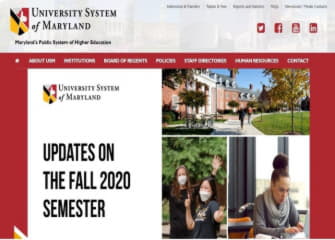
The University System of Maryland (USM) Momentum Fund has invested $500,000 in College Park-based VisiSonics Corporation, an early stage company that develops spatial audio technology and personalization software for audio playback, as well as hardware and software for audio capture and analytics, fund officials announce today.
This investment completes a financing round of $3.5 million for VisiSonics led by an audio company with ties to the music, cinema and gaming markets, according to Ramani Duraiswami, Founder and CEO of the company.
“We are thrilled to work with the Momentum Fund to help bring cutting-edge audio technology from Maryland to the rest of the world,” said Duraiswami. “Our goal is to build VisiSonics into a household name in audio, personalizing and enhancing sound for everyone. This and other investments will help us to do so.”
VisiSonics develops two main products. The first is Realspace 3D Audio (RS3D), which is spatial audio software featuring the company’s physics-based 3D audio algorithms. Ideal for gaming and headphones, from desktops to mobile, Realspace 3D Audio adds another dimension to sound, giving it a 360-degree radius and making it sound like it comes from different locations in space. The software can model rooms, render objects, run on both dedicated hardware or in software, and be personalized to users’ head and ear shapes with different hearing profiles. RS3D is available for development in Unity, Unreal and Wwise, and also as low level software on PCs, mobile devices and DSP platforms.
Realspace 3D Audio is available for licensing, with several million products in the market already featuring it under a white label license, according to Duraiswami.
VisiSonics’ second product line features audio cameras that can analyze environments for noise, capture audio in a 360-degree space, or focus on a specific area of interest. Each audio camera consists of an array of as many as 64 microphones. The company’s cameras are especially useful for analyzing industrial noise in a space, such as an automobile.
“We are pleased to support VisiSonics as the company positions itself to play a greater role in the audio marketplace,” said Claire Broido Johnson, Managing Director of the Momentum Fund. “With a portfolio of compelling technologies at a time when more and more consumers are engaged with audio, we think the company is poised to advance the state of the art in this pervasive industry.”
VisiSonics’ technology was initially developed at the University of Maryland through $6 million in funding from the National Science Foundation (NSF) and Defense Advanced Research Projects Agency (DARPA). The company has exclusive licenses to six university patents related to its technologies.
After launching in 2011, VisiSoncs further developed its technology through $1.6 million in grants from NSF and the National Institutes of Health (NIH), and the Maryland Industrial Partnerships (MIPS) program.
The company’s founders took over management of the company in 2017, brought it to solvency, and signed several business-to-business licensing deals. The company is now realizing $1.1 million in annual recurring revenues, according to Duraiswami.
“We are a next-generation spatial audio brand, driving emerging standards in immersive audio rendering, personalization and capture to consumers, which now include more than a billion high-end headphone users,” said Duraiswami. “Our plan, going forward, is to leverage our funding to expand our development, management and sales capacities to meet the needs of a rapidly growing audio marketplace.”
One prospective area of growth, according to Duraiswami, is personalization. VisiSonics has developed a way for customers to upload images of their ears, after which the company uses head-related transfer function (HRTF) information from the data provided, along with machine learning, to customize sound for every individual’s unique capabilities. The result is optimized sound for each user, said Duraiswami.
VisiSonics has eleven employees. The company has been a resident of the Mtech Ventures incubator program since 2012.
Duraiswami is also a Professor and Associate Chair for Graduate Education in the Department of Computer Science at the University of Maryland.
VisiSonics participated in an early NSF I-Corps cohort, with DC I-Corps Director Edmund Pendleton serving as the company’s mentor.
About the USM Momentum Fund
The Maryland Momentum Fund is an initiative of the University System of Maryland (USM) to provide late seed investment funding for promising technology ventures that come out of any of the 12 constituent USM institutions, its research parks, and its students, faculty, or graduates. With a $10M commitment from the USM already in place, the Fund co-invests with venture capitalists, foundations, and angel investors.
The Maryland Momentum Fund, which was established by the USM Board of Regents to support promising commercial opportunities arising from advances in research and intellectual property at USM campuses, has invested in 15 startups to date:??MF Fire, NextStep Robotics, the North American Wave Engine Corporation, Zest Tea, PaverGuide, Retrium, Veralox Therapeutics, Gemstone Biotherapeutics, Neoprogen, Minnowtech, ARMR Systems, Infercabuary, Datakwip, pathOtrak, KaloCyte, miRecule, N5 Sensors, and VisiSonics.The Fund is designed to create returns and support USM’s most innovative ideas as they enter the marketplace. Learn more at www.momentum.usmd.edu.
About VisiSonics
Founded in 2011, VisiSonics leverages world-class scientific discovery to add a third dimension to the sound you hear electronically, bringing 3D sound to gaming, virtual reality, and entertainment (movies and music) platforms. VisiSonics technologies for the rendering, capture and personalization of 3D sound are being licensed by companies for incorporation in their products. For more information, pleasevisitwww.visisonics.com.


































